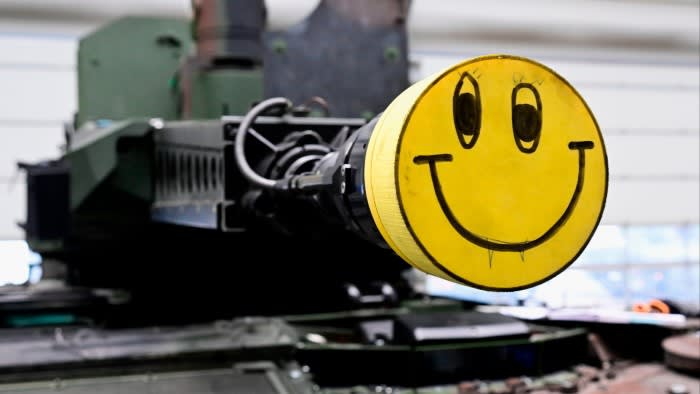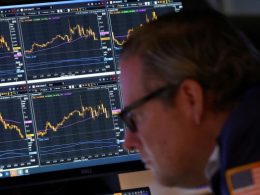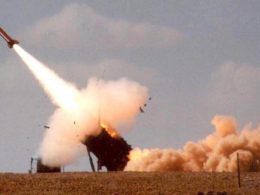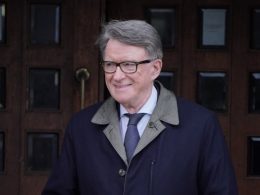Good morning. Moldovan President Maia Sandu was on course to win a second term in a run-off vote yesterday that was marred by “unprecedented” Russian efforts to influence the outcome.
Today, I explain how the spectre of Donald Trump’s return as US president has sharpened the debate on defence in the EU. And our parliament correspondent previews this week’s hearings for the next generation of European commissioners.
Henry will be back with you tomorrow.
Moment of truth
Europe must boost its arms sector to become more self-reliant on defence, yet another report has warned, one day before the US elections, the outcome of which will be pivotal on both sides of the Atlantic.
Context: Russia’s war in Ukraine sparked a reckoning for Europe’s defence capabilities, and Donald Trump’s potential return to the White House has exacerbated fears about the continent’s reliance on US security guarantees. Trump has threatened to leave Nato members which do not meet the alliance’s defence spending target at Russia’s mercy.
The US presidential race is one of the tightest ever, with the latest polls giving Kamala Harris the slightest advantage over Trump. European officials have been racing to prepare for either outcome.
“Harris or Trump? Some claim that the future of Europe depends on the American elections, while it depends first and foremost on us,” Polish Prime Minister Donald Tusk tweeted over the weekend. “On condition [that] Europe finally grows up and believes in its own strength. Whatever the outcome, the era of geopolitical outsourcing is over.”
A report by the European Council on Foreign Relations published today calls for a dedicated defence production act, which would give Brussels emergency powers to fund arms production, repurpose funding for crises or fast-track infrastructure construction.
“We need administrative fast lanes,” said Nicu Popescu, a former foreign minister of Moldova and co-author of the report. “Europe needs to be much faster in dealing with its own problems without always hoping that the US will come and save [it].”
He added that some EU countries are already developing such national legislation, and it was important that member states align their crisis policies.
Other experts and the European Commission have also made proposals in this vein, but so far member states have resisted efforts to transfer more powers to Brussels. Fiscally frugal member states such as Germany and the Netherlands have also opposed taking out fresh joint debt to fund the military.
The result tomorrow will be a powerful moment of truth for European capitals and their defence ambitions.
Chart du jour: Alternative trade
Russian exporters have begun to turn to barter deals in a bid to resolve payment delays prompted by western sanctions, making swap deals with Chinese companies.
Balance of power
Confirmation hearings for the next European Commission kick off today, but the quinquennial ritual could turn out less bloody than in past years, writes Andy Bounds.
Context: European parliament committees will quiz the 26 nominees for three hours each, before voting on whether to approve them. For the last 20 years, lawmakers have claimed at least one scalp.
After the 2019 elections, MEPs forced out Sylvie Goulard of France after a poor performance during her hearing, while two other candidates were eliminated over conflicts of interest.
This time, all 26 candidates have passed the latter test. Now they need two-thirds of relevant committee members to back them. Due to the delicate balance of power in the assembly, it may be that nobody is voted out.
Slovenia’s Marta Kos is under scrutiny for owning a lobbying firm. Dubravka Šuica, the Croatian nominated for a second term, was recently criticised by the Greens for not having declared meetings with lobbyists, which her spokesperson partly put down to a “clerical mistake”.
But both are part of the centre-right European People’s party, the biggest group in parliament, meaning that the Greens would need other progressive groups such as the Socialists and liberal Renew to knock them out.
That, in turn, could mean that the EPP sides with the far right to block progressive vice-president candidates such as Teresa Ribera of Spain and France’s Stéphane Séjourné.
“We have to protect our nominees,” said an official from one progressive party.
Another unpopular name has been Olivér Várhelyi, the Hungarian commissioner seeking a second term, who was once caught on mike appearing to call MEPs “idiots”. He later explained he was referring to his own staff. But rejecting him would hand Prime Minister Viktor Orbán a chance to offer another, potentially more controversial candidate.
The less destructive alternative is to demand a switch of portfolios, which has happened a couple of times.
If all goes smoothly and the new commission survives a final confirmation vote in plenary, it can take office on December 1.
What to watch today
-
Eurozone finance ministers meet.
-
Nato secretary-general Mark Rutte meets German Chancellor Olaf Scholz in Berlin.
Now read these
Are you enjoying Europe Express? Sign up here to have it delivered straight to your inbox every workday at 7am CET and on Saturdays at noon CET. Do tell us what you think, we love to hear from you: europe.express@ft.com. Keep up with the latest European stories @FT Europe









